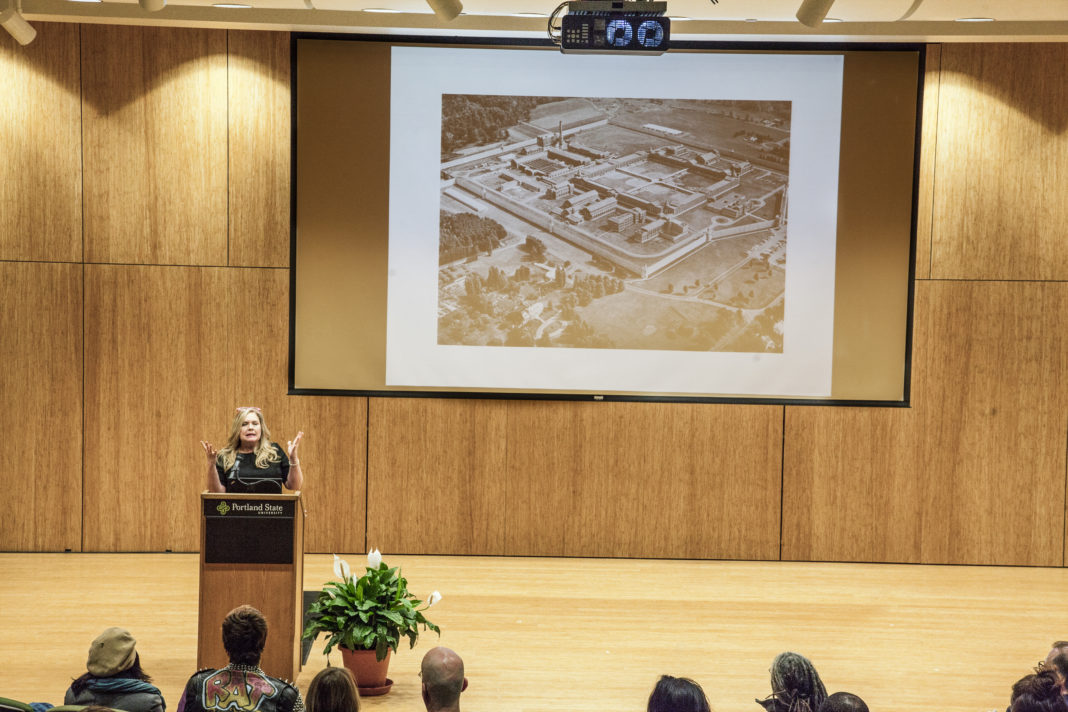Pulitzer prize-winning historian Dr. Heather Ann Thompson presented on the findings of her book Blood in the Water: The Attica Prison Uprising of 1971 and Its Legacy Thursday, Feb. 8 in an event hosted by the Portland State history, Black studies, and criminology and criminal justice departments.
Thompson spent 13 years researching the Attica State Prison uprising, during which she uncovered details of the revolt that had been stifled by the state of New York.
On September 9, 1971, around 1,000 of the 2,200 Attica inmates took 42 guards and staff members hostage. The inmates then named 28 demands they had to relieve what they said were civil rights violations and abuse.Zell Thomas/Portland State Vanguard
Five days later, 300 armed state troopers entered the Attica Correctional Facility, deployed an opaque wall of tear gas, then shot into the smoke for over two minutes. When the smoke cleared, 39 men, including nine prison guards, were found dead from gunfire and over 100 more suffered gunshot wounds.
Investigations following the revolts revealed inmate and witness accounts of severe physical, mental and sexual abuse by prison employees against prisoners.
Thompson is known as an expert in the racial politics of mass incarceration and has consulted for organizations like the Prison Policy Initiative and the Scholars Strategy Network. She has also presented on her book across the U.S. and internationally.

In a Q&A, Thompson described her process of writing Blood in the Water, as well as what her investigation taught her about America’s prison system at large.
Vanguard: What drove you to research Attica for so many years?
Thompson: As it is with most Americans, prisons were completely out of sight, out of mind for me. I thought of them as these places where horrible, horrible people went and that I certainly must not know anyone in prison. I had a naive understanding of prison.
However, this particular story has so many twists and turns—and bad guys and murders and cover-ups—that nobody wanted me to tell any part of the story, civil rights or otherwise. It then became this kind of 13-year odyssey to find the documents, conduct interviews and to get to what the real story was.
I felt a responsibility to learn more about that and to tell the history of it. During the retaking of the prison, there were so many deaths [of] prisoners and guards alike. Following that, the men of Attica were tortured, and there were numerous investigations and trials.
This story goes on for 30 years. [W]hen I started to write the book, we still didn’t know who the shooters were, why only prisoners had been indicted, and we still didn’t know what happened.
VG: Were you able to answer those questions?
HT: Yes, I was. All of them as a matter of fact. What happened was a massive cover-up involving the state of New York and its governor at the time, Nelson Rockefeller. Historians don’t use the term lightly, I might add. We don’t believe in conspiracies. We have to show that there was a concerted cover-up, and that’s just what I found. I even found one of three documents that named the shooters and published their names for the first time in history.
VG: What do you believe needs to change in America’s prison system?
HT: Everything. And I mean everything. I am a firm believer that our prisons, as they exist today, need to be abolished. And I know that abolition is a hard thing to wrap our heads around. That being said, putting human beings in cages does not make our society safer, and it does not make victims feel as though they have been honored.
We need to rethink how injustice works in America and consider how it works in other places and in other contexts. We are not even remotely close to that yet. So, for now, I am perfectly content to work extremely hard to do things like ending solitary confinement and ending the juvenile justice system.
This may seem controversial, but it is only controversial because we assume there are two sides to it. There are no two sides to slavery, there are no two sides to the Holocaust, and there are no two sides to mass incarceration.
The system that we have erected it is brutal, it doesn’t work, it traumatizes communities and families, and it actually makes us less safe.






